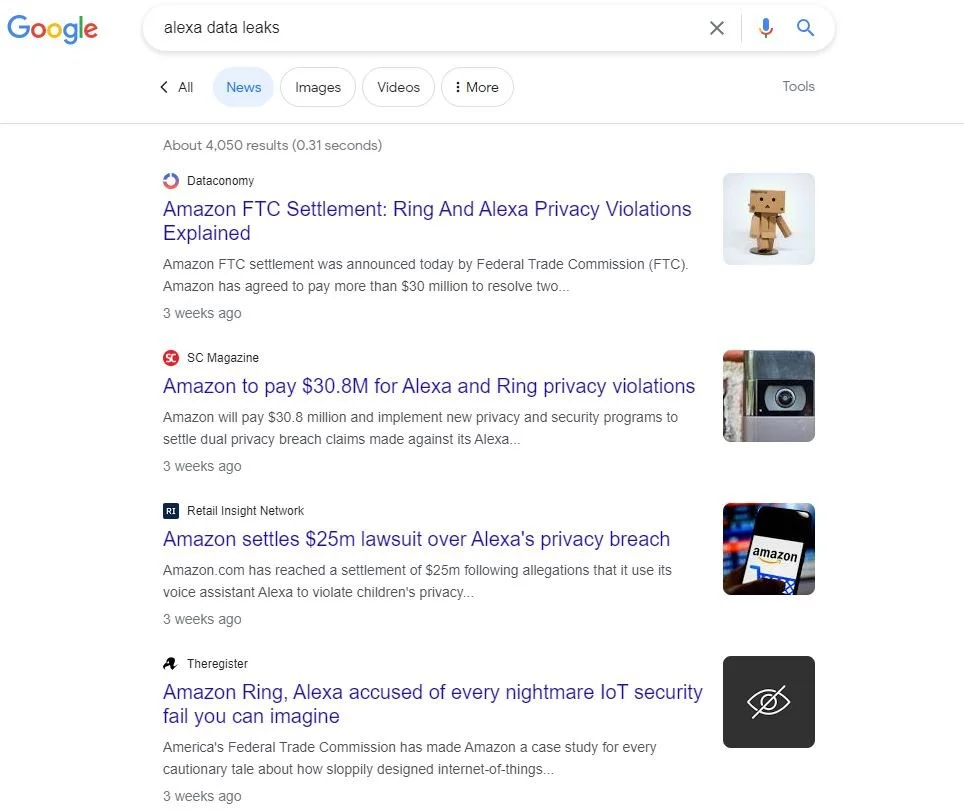Prediction 3 – Anticipation Becomes Real
As more businesses move from prescriptive analytics to predictive analytics, we will start seeing real-world uses of this technology affecting our daily lives; benefits like this will encourage more customers to share more data as the benefits become more natural.
A few years ago, the tech space was awash with in-home AI assistants. It felt like we would start to see the smart home come to life with the use of Google Home or Amazon’s Alexa. Like most, I dabbled briefly but immediately became concerned about having a microphone in my house and realised this was still new unregulated technology. I didn’t know where the data was stored and for how long, so I put my device away. How many of my personal, albeit mostly dull and humdrum, conversations would end up on a server somewhere? These were my concerns as a consumer, and then a little later, I started listening to talks on the application and potential of performance search for the voice and future applications for clients.
Lots of people I knew started using them to play music. ‘Hey, Alexa, play lounge jazz’, but nothing more out of all the potential applications seemed practical. Then we started hearing the inevitable stories of strange incidents with random products arriving in the post and whole conversations being packaged up and sent to random friends and family. Although these incidents were few and far between, it was certainly enough to make people start thinking about these listening devices’ costs and potential risks. Without more real-world applications, is it worth having a voice-activated, possibly temperamental listening device in the house?
‘…however, data-steered innovations have threatened security and privacy, creating hindrances for the global smart speaker market. The market was worth US$ 10.34 Billion in 2022.
‘Sales continue to grow, as do the applications of the new technology increase with safeguards for data and rogue AI’s.’
Source: Google Search Page.
As the Internet of Things network of hardware and software continues to build and grow around us, along with increasingly sophisticated technology, smart speakers’ actual application and value will become more real. For example, a smart speaker connected to a smart fridge connected to a wider real-world supply chain and a wider pool of customer data can finally mean you’re never out of milk, and what could start with ‘Hey Alexa, order milk’, could eventually lead us to forget Alexa is even there.
The out-of-milk scenario is a tired example of the potential of this technology. I love it, and I think it’s ironic that we’re back to square one.
When Alexa becomes just a cute name for AI software built into several appliances, the smart thermostat or even just the home itself, that knows to order milk even if you forget to ask it; when you ticked a box that said, ‘Yes, I’m interested in predictive ordering’, and it all just works, then this technology will have arrived.
As far back as 2013, Amazon took out a patent on predictive ordering technology that will be able to order products you want before you’ve purchased them yourself. Yeah, that’s right. Their predictive AI is becoming so advanced that they know what consumers want to buy before they do.
Source: US Patent Office.
This technology, referred to as ‘anticipatory shipping’, utilises Amazon’s extensive customer data to predict consumer preferences in advance. Items that are expected to be in demand are then shipped to a central hub to expedite delivery when the order is placed.
By employing this system, Amazon aims to enhance the customer experience by providing faster delivery times, which could lead to increased repeat business. Additionally, automating the ordering process helps to streamline operations for Amazon and reduce the workload for their employees.
Whereas ‘Hey Alexa’ requires a request, anticipatory purchasing could use data points, from conversations in the home to the prompt or order regularly used. The next milk bottle could arrive on the day the last is finished without a conscious human purchase involved. Consumers may risk giving up their privacy for this kind of value exchange, especially if everyone is doing it, or it could save their life.
Imagine hearing your friend rave about how an ambulance appeared at their doorstep 20 minutes before their elderly mother had a life-threatening stroke. Alexa detected changes in her voice patterns, modelled those patterns, and determined a high chance of cognitive impairment and a likely emergency. Don’t you love your mother enough to pay £50, £10 per month, and possibly waive some of her personal privacy if it means never worrying about finding her unresponsive at the bottom of the stairs? That’s more than enough to tip the value for most.


